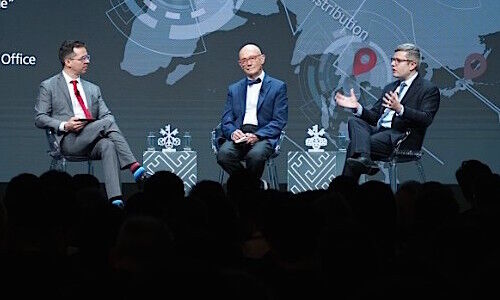Pascal Lamy: «Mr. Trump Will Look for a Photo Opportunity»
Will global trade settle and achieve peace? Will the US sign a lasting deal with China and other major economies? Uncertainty lies ahead but former WTO director-general Pascal Lamy believes that Donald Trump will nonetheless seek a photo op for celebration.
Mr. Lamy, the ongoing trade war has led to a lot of uncertainty with unprecedented levels of tariffs being imposed. At what levels will these tariffs end up?
I think at the end of the day you will have to cope with a US tariff – roughly 10 to 15 percent average – and a series of bilateral damage. 30 percent with China, 10, 15 percent with EU, on the bilateral side. So that's the landing zone but it will take time to get there. And in the meantime, brace for surprise.
Is there potential for a lasting trade deal between the US and China?
I can see the US and China stabilizing their respective tariffs without a formal deal. I also believe that Mr. Trump will probably look for a photo opportunity with Mr. Xi Jinping and then they will call this a deal.
What is your view on US trade policy under President Donald Trump?
The MAGA trade policy, I personally believe […] is flawed and the reason why it will not work is that the premises are wrong. The notion that you have to make America great again, implying that it's not in good shape, is wrong. The notion that the trade deficits are a problem is wrong. Starting from such a wrong analytical starting point, you can hardly believe that something good at the end of the day will come out of that. My own guess is that if it happens, it happens at a cost to the US economy.
Will this be a significant problem for China?
The big problem for China is its incapacity to move in the direction of dual circulation which they've been trying to do for decades unsuccessfully. That's the problem number one. And by the way, Chinese trade surplus is a consequence of this macro imbalance. That's where the reality is and this is what needs to change in order to change the antagonism that stems from these imbalances.
Will globalization stay alive?
The US is, let's say, roughly 15 percent of world trade. The remaining 85 percent so far has remained unchanged and I don't see any reason for anything like what the US has triggered bilaterally to be triggered within the rest of the crowd. Of course, there are reasons why globalization will be slower than it used to be in terms of its rhythm but the overall situation does not change. Whether it will be as rules-based as the previous one, I don't think so.
Pascal Lamy is the former director-general of the World Trade Organization (WTO) and former European Commissioner for Trade. He has extensive experience working at think tanks, such as European Horizons and Notre Europe, and had a brief stint at Crédit Lyonnais where he was involved in its restructuring and privatization. The responses above were based on a media Q&A during the 28th UBS Asian Investment Conference.



























